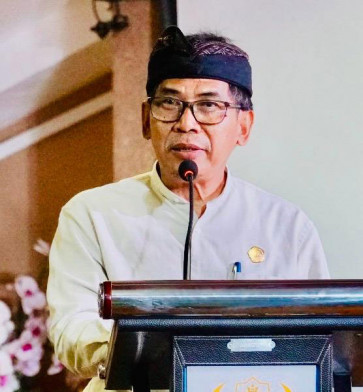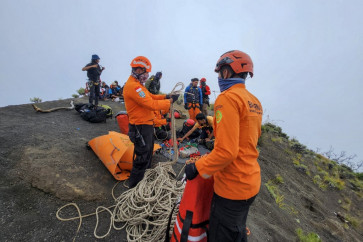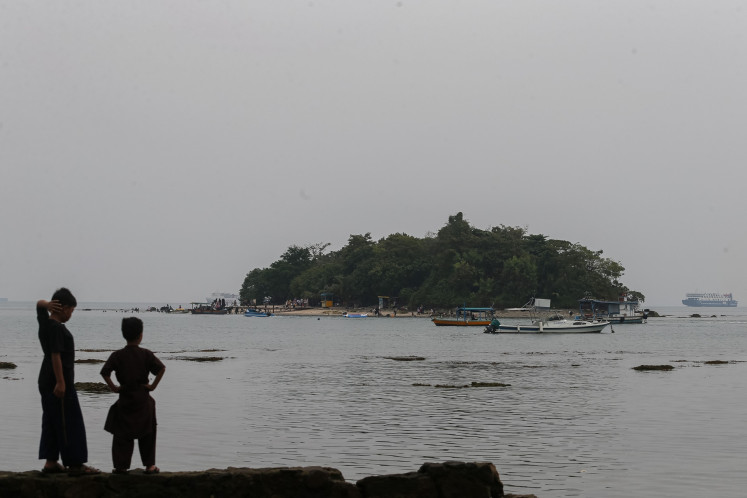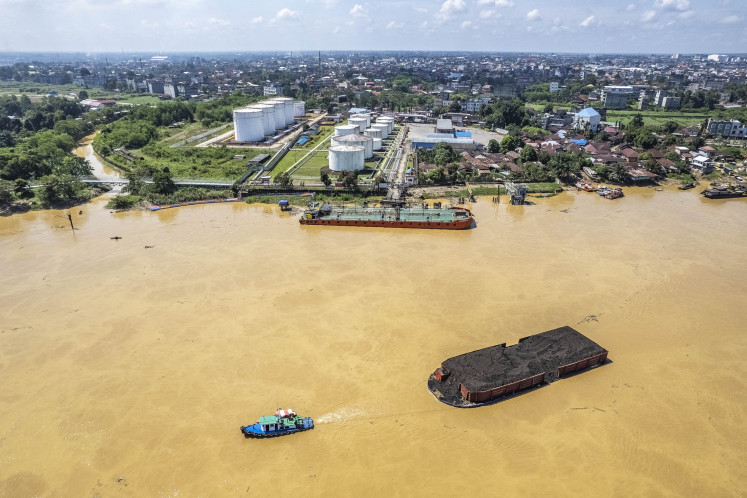Popular Reads
Top Results
Can't find what you're looking for?
View all search resultsPopular Reads
Top Results
Can't find what you're looking for?
View all search resultsJokowi urges calm as RI detects Omicron
Patient likely to have been infected by travelers in quarantine
Change text size
Gift Premium Articles
to Anyone
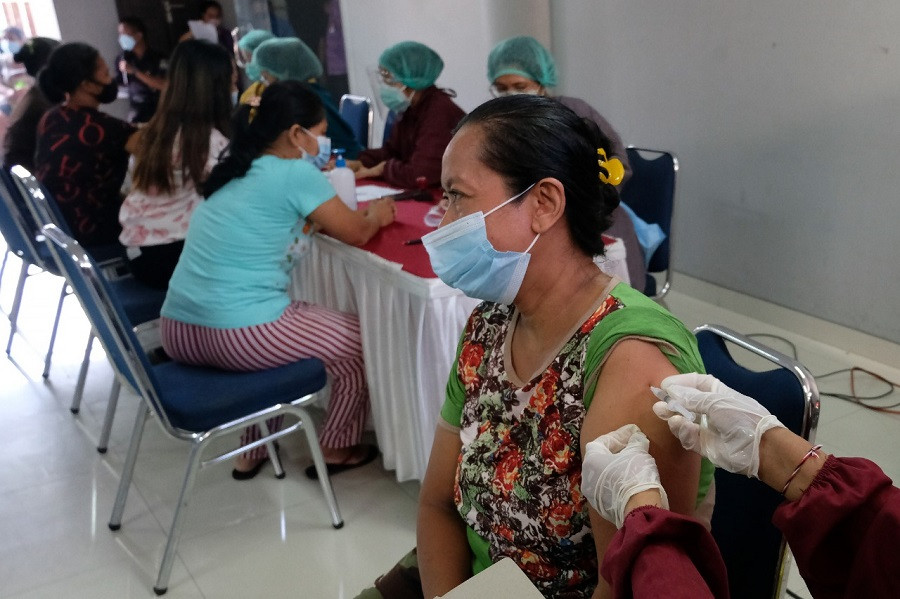
P
resident Joko "Jokowi" Widodo urged the public to remain calm and to maintain discipline in following health protocols after Indonesia discovered its first confirmed COVID-19 case caused by the emerging Omicron variant on Thursday.
The country has been on alert for the past few weeks as the new variant continues to spread across the globe at an unprecedented rate, with almost 80 countries having detected cases of Omicron, including neighboring Malaysia, Singapore and Australia.
The science remains inconclusive but early data suggest the variant is more transmissible than Delta, which wreaked havoc in Indonesia in July and caused the national healthcare system to overload.
Jokowi said the arrival of the Omicron variant in the country was "inevitable" and called on the public to work together to slow down and contain the spread as much as possible.
"Now that we have discovered Omicron, we should try our best to prevent it from spreading widely in Indonesia. We don't want to see any community transmissions happening," Jokowi said in a press conference on Thursday.
“It's important to be on alert but we should not panic because so far Omicron has not shown any characteristics that could endanger patients, especially those who have been vaccinated," he said.
Read also: Government urges people not to travel abroad as goal of reaching endemic status in sight
Jokowi advised people to get vaccinated as soon as possible and not to travel abroad for a while. He also asked local authorities to improve their testing-and-tracing capacity.
First patient has no travel history
The first Omicron infection was found in a cleaning service worker at the former athletes’ village in Jakarta that was converted into a COVID-19 quarantine facility and emergency hospital last year in the wake of the coronavirus outbreak.
Health authorities took nasal swabs from all cleaning service workers in the facility on Dec. 8 as part of regular COVID-19 screening and found three positive results, according to Health Minister Budi Gunadi Sadikin.
"Authorities then sent the samples to a Health Ministry lab for whole-genome sequencing and on Wednesday we found out that one of them had the Omicron variant,” Budi said on Thursday.
The patient, identified only as N, had no history of traveling overseas but Budi said it was likely that he was exposed to the virus by coming into contact with international travelers with COVID-19 who were isolating in the athletes’ village.
It remains unclear whether or not authorities have traced the patient who transmitted the virus to N.
Budi said N was asymptomatic and the latest PCR tests had now returned negative for coronavirus.
Read also: Govt ramps up COVID-19 surveillance as Omicron threat looms
Aside from N, the government has found five other suspected Omicron cases through a specific type of PCR tests that can detect the S-gene target failure (SGTF), which is one of the identifiers of the Omicron mutations.
The use of PCR tests with S-gene target failure was recommended by WHO late last month for faster Omicron detection, which can be confirmed through genome sequencing.
Two of the five suspect cases are Indonesian residents who have just returned from the United Kingdom and the United States and the remaining three are Chinese nationals who are visiting Manado, North Sulawesi. The three persons currently remain in quarantine in Manado.
"We are conducting genomic sequencing on their samples and we expect to have the results three days from now," Budi said.
He said the government had not discovered any indications of community transmission since N was residing in the athletes’ village and that the five suspect cases have all been quarantining in health facilities.
What we know so far
More research is needed to determine the characteristics of Omicron, but preliminary evidence suggests the new variant is more transmissible than the Delta variant – which was previously the most contagious variant.
However, symptoms caused by the Omicron variant are thought to be less severe than those of Delta.
A recent Hong Kong study suggested that Omicron multiplies itself 70 times more quickly in tissues that line airway passages compared with the Delta variant, which may facilitate person-to-person spread, they said. But in lung tissues, Omicron replicates 10 times more slowly than the original version of the coronavirus, which might contribute to a less-severe illness, Reuters reported. It said it was important to note that the severity of disease in humans is not determined only by virus replication but also by each person's immune response to the infection, which sometimes evolves into life-threatening inflammation.
New studies in the US, the UK, Hong Kong, South Africa and Israel found that COVID-19 vaccines appear to offer significantly less protection against the Omicron variant but that a booster dose likely restores most of the protection.
Since Omicron was first reported to the WHO by South Africa on Nov. 24, only one publicly confirmed death related to this variant has been reported so far, which occurred in the UK on Monday.
What's next?
Following the discovery of Omicron in Indonesia, Budi said the government would now conduct genome sequencing “of at least 10 percent of all positive samples nationwide”, twice as much as the previous rate.
The government is also planning to expand its COVID-19 booster program to members of the general public next month, with priority given to immune-compromised people and the elderly, in response to the development of Omicron outbreaks around the globe. So far, only health workers have received booster shots in the country.
Read also: Indonesia to expedite Omicron booster rollout
The Transportation Ministry, meanwhile, will closely monitor observance of prevailing health protocols in all modes of transportation, both domestic and international, and points of entry.
Epidemiologist Dicky Budiman warned the government to handle the Omicron situation carefully as it may pose a bigger threat to Indonesia's healthcare system compared with Delta.
"Track all people who have been in contact with N and test them using PCR S-gene tests. Authorities should also monitor all patients who have been discharged from the athletes’ village in the past two weeks,” he said.
Public health expert Tjandra Yoga Aditama said the government should also accelerate vaccination.


